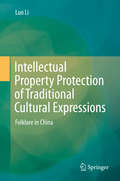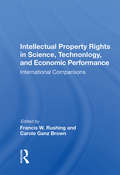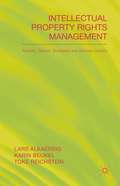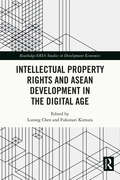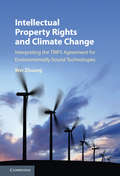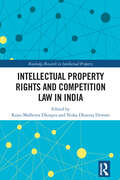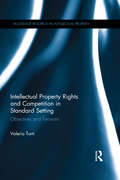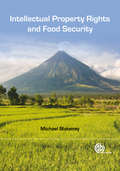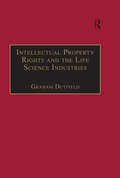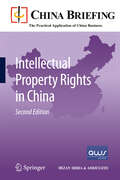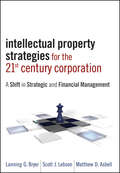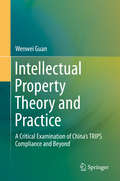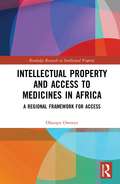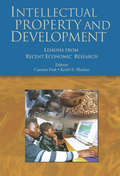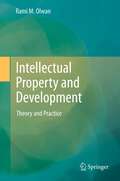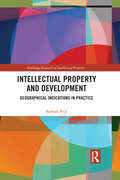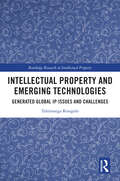- Table View
- List View
Intellectual Property Protection of Traditional Cultural Expressions
by Luo LiThe work reviews issues concerning the protection of folklore through the intellectual property legal system, then explores two main issues in the protection of Chinese folklore. The first issue is the influence of Chinese traditional culture on the Chinese intellectual property legal system and Chinese society. The second concerns the deficiencies of the Chinese intellectual property system with regard to folklore. Both issues are examined through a survey on the weak public recognition of intellectual property law and folklore in Chinese society. The book also reveals the practical issues that have arisen in Southwest China through case studies. After analysing these issues, the work designs a model law specifically for folklore and also provides suggestions for how the current intellectual property legal system could establish a comprehensive legal protection system for folklore. Furthermore, the work shows that its proposed model law is effective in practice by resolving the issues in the case studies presented.
Intellectual Property Rights In Science, Technology, And Economic Performance: International Comparisons
by Francis W. Rushing Carole Ganz BrownThis book discusses the economic, political, legal, and social concerns of the world's governments on intellectual property rights. It analyzes the systems of both developed and developing economies and draws a clear picture of the status of intellectual property regimes around the world.
Intellectual Property Rights Management
by Lars Alkaersig Karin Beukel Toke ReichsteinIntellectual Property Rights Management explores how the entire toolbox of intellectual property (IP) protection and management are successfully combined and how firms generate value from IP. In particular, this book provides a framework of archetypes which firms will be able to self-identify with and which will allow companies to focus on the IP and IP Management issues most relevant to them. By doing so, the authors offer further insights as to the use of IP and IP management practices across firms. By looking at empirical data covering the population of firms, the findings not only pertain to large organization but also reflect the practices and operations that reside in SMEs. This volume also utilizes labor market and firm data to determine whether there is a definitive relationship between IP and economic performance on the firm level.
Intellectual Property Rights and ASEAN Development in the Digital Age (Routledge-ERIA Studies in Development Economics)
by Fukunari Kimura Lurong ChenThe trade-investment-service-intellectual property (IP) nexus remains at the heart of economic development and the main features of which are global value chains (GVCs) and digitalisation. The protection of intellectual property rights (IPR) has become a critical issue not only for advanced economies but also for emerging markets. This edited volume contributes to the debates on IPR protection and economic development from the perspective of Association of Southeast Asian Nations (ASEAN) member states. The book provides insights into the mechanism and evidence on how effective IPR protection will increase economic and social welfare via promoting innovation activities and providing incentives to diffuse knowledge and transfer technologies. Written by economists and lawyers from the region, these experts share their latest findings and thoughts on how countries in Southeast Asia have been progressively improving IPR protection and increasing the interoperability of different IPR regimes through regional cooperation to facilitate business operations in the context of digital transformation.
Intellectual Property Rights and Climate Change: Interpreting the TRIPS Agreement for Environmentally Sound Technologies
by Wei ZhuangAs the world confronts global warming, there is a growing consensus that the TRIPS Agreement could be a more effective instrument for mitigating climate change. In this innovative work, Wei Zhuang systematically examines the contextual elements that can be used in the interpretation of the TRIPS Agreement with a view to enhancing innovation and transfer of environmentally sound technologies. Zhuang proposes a balanced and pro-competitive interpretation that could be pursued by policy makers and negotiators. This comprehensive, multidisciplinary study will help academics and policymakers improve their understanding of the contemporary international legal regimes governing intellectual property rights and innovation and transfer of environmentally sound technologies. It also offers practical guidance for further developing a legal system capable of responding to the challenges posed by climate change.
Intellectual Property Rights and Competition Law in India (Routledge Research in Intellectual Property)
by Rajni Malhotra Dhingra Nisha Dhanraj DewaniThis book explores the relationship between intellectual property law and competition law, proposing a harmonious equilibrium in the dynamic landscape of evolving technology. It explores how intellectual property rights (IPR) can be effectively balanced with competition law considerations, offering insights into navigating the evolving intersection of legal frameworks in the realm of technology and innovation.In the rapidly evolving landscape of India's legal framework, the intersection of IPR and competition law has become a critical focal point. This book dissects the regulatory landscape, offering a thorough analysis of India's competition law and its application in conjunction with patent, copyright, trademark, blockchain technologies, computer software, artificial intelligence, and more. Covering landmark legal decisions, precedents, and emerging trends that shape the balance between fostering innovation and preventing anticompetitive practices, the book also uses case studies involving WhatsApp Vs. CCI and Vidya Drolia case. Focusing on India, but with lessons for a global audience, the book brings together contributions from experts across disciplines, to promote innovative solutions to balancing IP and competition law with technological advancements.The book will be of interest to researchers in the field of the law of emerging technologies, IP law, and competition law.
Intellectual Property Rights and Competition in Standard Setting: Objectives and tensions (Routledge Research in Intellectual Property)
by Valerio TortiCompetition and intellectual property rights (IPRs) are both necessary for a market to work efficiently and to promote consumer welfare. Properly applied, intellectual property rules define a legal framework which allows undertakings to profit from their inventions. This in turn encourages competition among firms and enhances dynamic efficiency, to the benefit of consumer welfare. Standard setting represents one of the fields where the interaction between competition law and IPRs clearly comes to light. The collaborative goal of standard setting organizations (SSOs) is to adopt and promote standards that either do not conflict with anyone’s right or, if they do, are developed under condition that patents are licensed under defined terms. This book examines the tension between IPRs and competition in the standard setting field which can arise when innovators over-exploit the rights they have been granted and hold up an entire industry. The book compares EU and U.S. jurisdictions with a particular focus on the IT and telecommunication sectors. It scrutinizes those practices which could harm standard setting and its goals, looking at misleading conducts by SSOs’ members which may lead to breach the EU and U.S. antitrust provisions on abuse of market power. Recent developments in EU and U.S. standard setting are analysed highlighting the differences in enforcement approaches. The book considers how the optimal balance between IPRs and industry standards can be struck, suggesting a policy model which takes into account both innovators’ interests and SSOs’ goals.
Intellectual Property Rights and Emerging Technology: 3D Printing in China
by James Griffin Hing Kai Chan Hui Leng Choo Onyeka Osuji3D printing poses many challenges to the traditional law of intellectual property (IP). This book develops a technical method to help overcome some of these legal challenges and difficulties. This is a collection of materials from empirical interviews, workshops and publications that have been carried out in one of the world's leading research projects into the legal impact of 3D printing. The project was designed to establish what legal challenges 3D printing companies thought they faced, and having done that, to establish a technical framework for a solution.
Intellectual Property Rights and Food Security
by Michael BlakeneyAt the time of the first World Food Summit in 1996 it was estimated that more than 800 million people did not have enough food to meet their basic nutritional needs. The steep rise in global food prices has exacerbated the situation, causing the 2008 G8 Hokkaido Toyako Summit to issue a Statement on Food Security which expressed concern that global food security was under a severe threat. The root cause of food insecurity is poverty. Trade liberalization is part of the long-term solution, as are improvements in agricultural productivity. This book examines the contribution which intellectual property rights can make in the struggle for food security in developing countries.
Intellectual Property Rights and the Life Science Industries: A Twentieth Century History (Globalization and Law)
by Graham DutfieldThis book analyses the history of the international patent regime and the life science industries, both of which can be traced back to the late 19th century. The development of patent law is inextricably linked to expanding capacities to elucidate, manipulate and commercially exploit the molecular properties of micro-organisms, plants, animals and other organic raw materials. The story of the life science industries begins with the European synthetic dyestuff firms and culminates in present-day conglomerates like Aventis, Novartis and Pharmacia. Throughout the last century, chemical, pharmaceutical, seed and biotechnology firms were actively involved in reforming patent law and plant variety rights. The major beneficiaries have been the largest firms whose market dominance and influence over peoples' lives - aided by friendly intellectual property laws - has never been greater. This sparkling and stimulating book reveals the key repercussions caused by the expansion of life science industries for issues of international equity, public health, food security and biological diversity.
Intellectual Property Rights in China
by Andy Scott Sam Woollard Chris Devonshire-EllisThis Guide is a detailed overview of all aspects of IPR and protection in China. Produced in association with AWS, the Austrian Federal Bank's specialist IPR unit based in Shanghai, this is an essential work for any businessman trading with or conducting business in China. From covering protocol for dealing with Trade Fairs, to the application processes for trademarks, patents, copyright and licensing, as well as dealing with infringements and enforcement,this guide is a practical reference for any businessman with concerned with their IPR in China.
Intellectual Property Rights in China
by Zhenqing ZhangOver the past three decades, China has transformed itself from a stagnant, inward, centrally planned economy into an animated, outward-looking, decentralized market economy. Its rapid growth and trade surpluses have caused uneasiness in Western governments, which perceive this growth to be a result of China's rejection of international protocols that protect intellectual property and its widespread theft and replication of Western technology and products. China's major trading partners, particularly the United States, persistently criticize China for delivering, at best, half-hearted enforcement of intellectual property rights (IPR) norms. Despite these criticisms, Zhenqing Zhang argues that China does respect international intellectual property rights, but only in certain cases. In Intellectual Property Rights in China, Zhang addresses the variation in the effectiveness of China's IPR policy and explains the mechanisms for the uneven compliance with global IPR norms.Covering the areas of patent, copyright, and trademark, Zhang chronicles how Chinese IPR policy has evolved within the legacy of a planned economy and an immature market mechanism. In this environment, compliance with IPR norms is the result of balancing two factors: the need for short-term economic gains that depend on violating others' IPR and the aspirations for long-term sustained growth that requires respecting others' IPR. In case studies grounded in theoretical analysis as well as interviews and fieldwork, Zhang demonstrates how advocates for IPR, typically cutting-edge Chinese companies and foreign IPR holders, can be strong enough to persuade government officials to comply with IPR norms to achieve the country's long-term economic development goals. Conversely, he reveals the ways in which local governments protect IPR infringers because of their own political interests in raising tax revenues and creating jobs.
Intellectual Property Rights in Pharmaceutical Test Data: Origins, Globalisation and Impact
by Adam BuickThis book considers the intellectual property protection of clinical test data that has been submitted to governments, in particular through test data exclusivity rights. It focuses on how these intellectual property rights first emerged in the early 1980s, how they have globalised over the past four decades, and what impact they have had upon access to medicine. This book makes a number of significant and original contributions to the literature around the protection of submitted test data. First, the book draws upon the theory of regulatory globalisation to provide an explanation of how intellectual property rights in submitted pharmaceutical test data have become nearly ubiquitous in the legal systems of most major economies. Second, through a comprehensive analysis and synthesis of provisions on the protection of submitted test data in free trade agreements, as well as a comparison of a range of national approaches to the protection of submitted test data, it reveals the broader global regulatory pattern that has given rise to these intellectual property rights. Third, by analysing data on drug approvals in the US, it provides an empirical insight into the impact of test data exclusivity in national pharmaceutical markets. Fourth, the book covers a number of developments regarding test data exclusivity that have occurred as a result of responses to the COVID-19 pandemic, both at the national level as well as at the World Trade Organisation (WTO). This book will appeal to academics researching the intersection of intellectual property and the life sciences, civil society activists working to promote access to medicines, and students (particularly those at the post-graduate level) studying the relationship between intellectual property and medicine.
Intellectual Property Rights, Copynorm and the Fashion Industry: A Comparative Analysis
by Marlena JankowskaThis book traces the development of the fashion industry, providing insight into the business and, in particular, its interrelations with copyright law. The book explores how the greatest haute couture fashion designers also had a sense for business and that their attention to copyright was one of the weapons in protecting their market position. The work also confronts the peculiarities of the fashion industry as a means of demonstrating the importance of intellectual property protection while pointing out the many challenges involved. A central aim is to provide a copyrightability test for fashion goods based on detailed analysis of the legal regulations in the USA and EU countries, specifically Italy, France, the Netherlands, Germany and Poland. The book will be of interest to researchers and academics working in the areas of Intellectual Property Law, Copyright Law, Business Law, Fashion Law and Design.
Intellectual Property Rights, Copynorm and the Fashion Industry: A Comparative Analysis
by Marlena JankowskaThis book traces the development of the fashion industry, providing insight into the business and, in particular, its interrelations with copyright law. The book explores how the greatest haute couture fashion designers also had a sense for business and that their attention to copyright was one of the weapons in protecting their market position. The work also confronts the peculiarities of the fashion industry as a means of demonstrating the importance of intellectual property protection while pointing out the many challenges involved. A central aim is to provide a copyrightability test for fashion goods based on detailed analysis of the legal regulations in the USA and EU countries, specifically Italy, France, the Netherlands, Germany and Poland. The book will be of interest to researchers and academics working in the areas of Intellectual Property Law, Copyright Law, Business Law, Fashion Law and Design.
Intellectual Property Strategies for the 21st Century Corporation
by Lanning G. Bryer Scott J. Lebson Matthew D. AsbellA practical approach to the modern management of intellectual property The world has changed significantly in the past decade, resulting in new behavior and practice related to the ownership and management of intellectual property. This book helps executives, attorneys, accountants, managers, owners, and others understand the legal, technological, economic, and cultural changes that have affected IP ownership and management. It provides case studies, practical examples and advice from seasoned and enduring professionals who have adopted new and streamlined methods and practices whether as in-house or outside counsel, or service providers. Provides a practical yet global approach to corporate IP management Serves as a resource for in-house and outside counsel, executives, managers, accountants, consultants and others at mid-size and large corporations Helps professionals navigate the numerous new challenges that have changed the ways in which intellectual property is obtained and managed Details the latest trends in valuation, exploitation, and protection of intellectual property Extensive coverage of the legal, financial, accounting and general business aspects of intellectual property The combined expertise of lawyers, accountants, economists and other business professionals Timely and relevant in view of the global economic recession amidst rampant technological development, this book offers new solutions, practices, policies and strategies as a result of changes in economies and markets, laws, globalization, environment, and public perception.
Intellectual Property Strategy
by John PalfreyMost managers leave intellectual property issues to the legal department, unaware that an organization's intellectual property can help accomplish a range of management goals, from accessing new markets to improving existing products to generating new revenue streams. In this book, intellectual property expert and Harvard Law School professor John Palfrey offers a short briefing on intellectual property strategy for corporate managers and nonprofit administrators. Palfrey argues for strategies that go beyond the traditional highly restrictive "sword and shield" approach, suggesting that flexibility and creativity are essential to a profitable long-term intellectual property strategy--especially in an era of changing attitudes about media. Intellectual property, writes Palfrey, should be considered a key strategic asset class. Almost every organization has an intellectual property portfolio of some value and therefore the need for an intellectual property strategy. A brand, for example, is an important form of intellectual property, as is any information managed and produced by an organization. Palfrey identifies the essential areas of intellectual property--patent, copyright, trademark, and trade secret--and describes strategic approaches to each in a variety of organizational contexts, based on four basic steps. The most innovative organizations employ multiple intellectual property approaches, depending on the situation, asking hard, context-specific questions. By doing so, they achieve both short- and long-term benefits while positioning themselves for success in the global information economy.
Intellectual Property Strategy (The MIT Press Essential Knowledge series)
by John PalfreyHow a flexible and creative approach to intellectual property can help an organization accomplish goals ranging from building market share to expanding an industry.Most managers leave intellectual property issues to the legal department, unaware that an organization's intellectual property can help accomplish a range of management goals, from accessing new markets to improving existing products to generating new revenue streams. In this book, intellectual property expert and Harvard Law School professor John Palfrey offers a short briefing on intellectual property strategy for corporate managers and nonprofit administrators. Palfrey argues for strategies that go beyond the traditional highly restrictive “sword and shield” approach, suggesting that flexibility and creativity are essential to a profitable long-term intellectual property strategy—especially in an era of changing attitudes about media.Intellectual property, writes Palfrey, should be considered a key strategic asset class. Almost every organization has an intellectual property portfolio of some value and therefore the need for an intellectual property strategy. A brand, for example, is an important form of intellectual property, as is any information managed and produced by an organization. Palfrey identifies the essential areas of intellectual property—patent, copyright, trademark, and trade secret—and describes strategic approaches to each in a variety of organizational contexts, based on four basic steps.The most innovative organizations employ multiple intellectual property approaches, depending on the situation, asking hard, context-specific questions. By doing so, they achieve both short- and long-term benefits while positioning themselves for success in the global information economy.
Intellectual Property Theory and Practice
by Wenwei GuanThis book explains China's intellectual property perspective in the context of European theories, through a critical examination of intellectual property theory and practice focused on China's compliance with the Agreement on Trade-Related Aspects of Intellectual Property Rights (TRIPS). The author's critical review of contemporary intellectual property philosophy suggests that justifying intellectual property protection through Locke or Hegel's property theories internalizes a theoretical paradox. "Professor Wenwei Guan's treatment of intellectual property law and practice in the PRC offers new perspectives that enrich an already active field of study . . . This book will be a useful contribution to academic and policy discourses examining conceptual and operational dimensions of China's intellectual property protection system and the broader process of China's international engagement. " - Dr. Pitman B. Potter, Professor of Law, University of British Columbia, Canada "Dr. Guan reminds us of the daunting challenge of the public-private divide in forming and reforming TRIPS regime; how this regime has failed to address development needs and public concerns in developing countries like China; and how TRIPS's 'birth defect' can be overcome and its evolution can be put back on the right track. " - Dr. Yahong Li, Associate Professor at Faculty of Law, Hong Kong University
Intellectual Property and Access to Medicines in Africa: A Regional Framework for Access (Routledge Research in Intellectual Property)
by Olasupo OwoeyeA major target of Goal 3 of the Sustainable Development Goals adopted by the United Nations in 2015 is the elimination of ‘the epidemics of AIDS, tuberculosis, malaria and neglected tropical diseases’ and combating ‘hepatitis, water-borne diseases and other communicable diseases’. Intellectual property (IP) has been identified as one of the factors impeding access to affordable medicines in developing countries, especially in relation to the HIV pandemic. This book examines the scope of the existing flexibilities in international IP law for promoting access to medicines. It analyses the factors accounting for the underutilisation of the flexibilities in Africa and the measures that African countries may adopt to address the IP barriers to access to medicines. It explores the regional strategies that Africa can adopt to resolve the tension between IP regimes and access to medicines. It also highlights how trade liberalisation and regional integration can play crucial roles in enhancing the use of TRIPS flexibilities, local pharmaceutical manufacturing and access to medicines in Africa. By adopting qualitative research methods to investigate how African countries may effectively use IP to serve public health purposes through the stratagem of regional integration, this book will be a valuable contribution to the existing literature on IP.
Intellectual Property and Clean Energy: The Paris Agreement and Climate Justice
by Matthew RimmerThis collection considers the future of climate innovation after the Paris Agreement. It analyses the debate over intellectual property and climate change in a range of forums – including the climate talks, the World Trade Organization, and the World Intellectual Property Organization, as well as multilateral institutions dealing with food, health, and biodiversity. The book investigates the critical role patent law plays in providing incentives for renewable energy and access to critical inventions for the greater public good, as well as plant breeders’ rights and their impact upon food security and climate change. Also considered is how access to genetic resources raises questions about biodiversity and climate change. This collection also explores the significant impact of trademark law in terms of green trademarks, eco labels, and greenwashing. The key role played by copyright law in respect of access to environmental information is also considered. The book also looks at deadlocks in the debate over intellectual property and climate change, and provides theoretical, policy, and practical solutions to overcome such impasses.
Intellectual Property and Development
by Carsten Fink Keith E. MaskusInternational policies toward protecting intellectual property rights have seen profound changes over the past two decades. Rules on how to protect patents, copyright, trademarks and other forms of intellectual property have become a standard component of international trade agreements. Most significantly, during the Uruguay Round of multilateral trade negotiations (1986-94), members of what is today the World Trade Organization (WTO) concluded the Agreement on Trade Related Intellectual Property Rights (TRIPS), which sets out minimum standards of protection that most of the world's economies have to respect. How will developing countries fare in this new international environment? Intellectual Property and Development brings together empirical research that assesses the effects of changing intellectual property regimes on various measures of economic and social performance - ranging from international trade, foreign investment and competition, to innovation and access to new technologies. The studies presented point to an important development dimension to the protection of intellectual property. But a one-size fits all approach to intellectual property is unlikely to work. There is need to adjust intellectual property norms to domestic needs, taking into account developing countries' capacity to innovate, technological needs, and institutional capabilities. In addition, governments need to consider a range of complementary policies to maximize the benefits and reduce the costs of reformed intellectual property regulations. This book will be of interest to students and scholars of international law, particularly in the area of intellectual property rights, international trade, and public policy.
Intellectual Property and Development
by Rami M. OlwanThe book examines the correlation between Intellectual Property Law - notably copyright - on the one hand and social and economic development on the other. The main focus of the initial overview is on historical, legal, economic and cultural aspects. Building on that, the work subsequently investigates how intellectual property systems have to be designed in order to foster social and economic growth in developing countries and puts forward theoretical and practical solutions that should be considered and implemented by policy makers, legal experts and the Word Intellectual Property Organization (WIPO).
Intellectual Property and Development: Geographical Indications in Practice (Routledge Research in Intellectual Property)
by Barbara PickThe legal protection of geographical indications (GIs) is characterised by a variety of approaches which translates the many objectives attached to them. These range from protection of the consumers and producers’ interests against unfair competition practices, to territorial development, to preservation of cultural heritage and natural resources. Looking beyond formal legal protection for GIs, this book seeks to re-draw attention to what happens in the real world by exploring the opportunities and constraints which influence whether regional product branding initiatives are successful. It asks: what makes GIs work in practice and does the type of legal protection matter? To answer these questions, this book takes a comparative case study approach and draws upon empirical data collected from 12 GI initiatives in two countries, France and Vietnam. In doing so, this book not only provides new insights and perspectives to the ongoing international legal dispute over GIs, it also contributes to unpacking the factors that make GIs work in practice to bring about economic and non-economic benefits and ultimately support the empowerment of local producers. This book will be of interest to legal academics and practitioners as well as food sociologists, economists, anthropologists and rural development experts.
Intellectual Property and Emerging Technologies: Generated Global IP Issues and Challenges (Routledge Research in Intellectual Property)
by Tshimanga KongoloThis book evaluates issues and challenges emerging from the interaction between intellectual property (IP) and new technologies, namely artificial intelligence (AI), big data, social media, internet of things (IoT), metaverse, blockchain, video gaming, and voice cloning.New technologies have not only shaken the current IP system but show the limits of a framework which was designed more than three centuries ago. As technological innovations have rendered some established IP rules and principles difficult to apply, new approaches are required to adequately respond to ensuing challenges. This volume uses existing case studies and prevailing court decisions to underline the dynamic of the current system. It proposes adjustments to accommodate new technologies within the current IP structure. The book reflects on the challenges created by new technologies and explores alternative ways to respond to these issues.This book will assist IP experts, academics, professionals, and policy makers in their undertakings to understand various issues generated by new technologies. It will also be of interest to researchers in the field of IP law and the law of emerging technologies.
